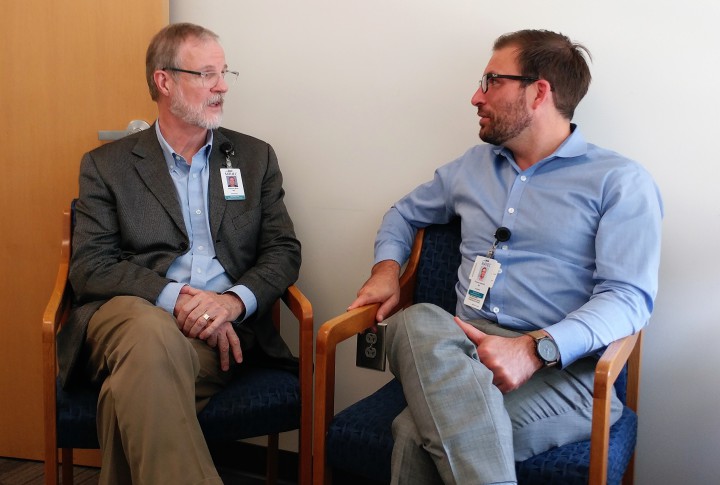After the drowning death of her 2-year-old daughter, Sue Poston attempted to ease the pain of her loss with opioid pills. It seemed the only way to dull the post-traumatic stress and depression that were overwhelming her.
But the pain of addiction only added to her misery.
Opioid addiction is one of the most powerful illnesses one can have, says Poston, who has been in recovery four years and now works as program director for Sunrise Community, a peer-run drop-in recovery community center in Asheville that helps people move into and stay in recovery.
Health and law enforcement officials in North Carolina are trying to deal with an epidemic of opioid addiction, and they’re moving away from criminal prosecution for substance use disorders. Instead, the newer model is to coordinate care across the divide between physical and behavioral health “silos” (separate areas of service provision).
Helping moms and babies
At MAHEC, obstetrics practitioners ask women whether they have used drugs.
“Five years ago or five minutes ago, it doesn’t matter,” says family nurse practitioner Melinda Ramage. “We’re not here to judge. We’re here to help.”
Too often, women with substance use disorders live under the threat of losing their babies and landing in jail.
“How do you expect a woman who has had her baby taken away to react?” says Dr. Blake Fagan, chief education officer for the Mountain Area Health Education Center. “She’s going to be depressed, and that’s going to increase her chances of using and of suicide.”
Part of the problem in treating addiction, especially during and after pregnancy, is that care has been compartmentalized into silos — women too often get prenatal care in one place, behavioral health treatment in another and treatment for substance use disorder in still another place.
“Women, especially women who are pregnant, have trouble with multisystem care,” Ramage says. “More than half of pregnancies are unintended, so women weren’t planning on dealing with their addiction and pregnancy. … We know women disclose to their obstetricians first, and they need a safe place to disclose.”
Another benefit of integrated care is that women who need treatment with Suboxone (a prescription medicine that deadens the effects of opiates, helping people stay away from them) can get it in their physician’s office instead of having to travel to a separate clinic in addition to a clinic for treatment of psychiatric illness.
For low-income patients, many of whom don’t get paid for time off, it means a couple of hours away from work instead of a full day.
The challenge of rural health care
In rural areas, care for addiction and behavioral health issues is even more difficult to coordinate because such areas too often have high need but few practitioners. To help address that problem, MAHEC has added a psychiatry residency program, funded by a state grant, that will place residents in family practices and clinics beginning in their second year of the four-year program.

Dr. Steve Buie, the psychiatrist who oversees the program for MAHEC, says it will help address the large and growing shortage of mental health services across Western North Carolina.
“We have seen an overall erosion of mental health services since the 1980s,” Buie says.
The attempt to reform mental health services a decade ago led to near-catastrophe, Buie says. Inpatient beds were reduced across the state, and service providers closed one after another in the ensuing chaos of constant rule changes and funding decreases.
The Asheville area alone has lost 300 mental health inpatient beds in the past 25 years, with the closing of Appalachian Hall in 1999 and Highland Hospital in 1993, Buie notes, forcing people to travel to Hickory, Thomasville and Kings Mountain for care. Broughton, the state psychiatric hospital in Morganton, is always filled to capacity. And changes to the mental health system a decade ago closed hundreds of additional beds at state psychiatric hospitals across the state, putting even more stress on the system.
“Imagine the uproar if someone who needed cardiac catheterization had to travel that far,” Buie says.
But the dearth of behavioral health funding and services has made providers more creative, Buie adds.
MAHEC’s residency program will attract psychiatrists to the mountains, and Buie believes some will love the region and stay here to practice.
That’s what attracted Dr. Thomas Campbell, a first-year resident in psychiatry. He was raised in rural eastern Washington state and was looking for a place he might want to stay. The mountains of Western North Carolina fit the bill.
“Job one is to get the best training I can get and to be the best psychiatrist I can,” he says. “I have always wanted to practice somewhere rural, so this program works for me.”
Putting psychiatric specialists in family practices will help people get diagnosed and treated earlier, when such chronic illnesses are easier to manage. In the end, it is a far less expensive and far more humane way to deal with behavioral health issues, Buie says.
‘It’s too easy to overdose’
Getting people diagnosed and treated earlier, in the narrow window of time when they are willing to seek care, is the premise of Vaya Health’s care. And making sure they don’t overdose and die of opiates in the interim is what’s behind Vaya’s efforts to make naloxone widely available, especially as more heroin laced with fentanyl is being seen on the streets. People who become addicted to pain pills often turn to heroin when they no longer can get prescriptions for the pills because heroin is cheaper than pills on the street, says Fagan.
Vaya, the region’s managed care agency for behavioral health, developmental disabilities and substance abuse services, recently packaged and distributed some 24,000 packets, each with two doses of naloxone as well as information about how to get help for addiction. Gov. Roy Cooper visited the agency to issue the proclamation for September as National Recovery Month.
Each kit has two doses because with some of the tainted heroin, a single dose isn’t enough to reverse the effects, says Jesse Smathers, director of network development at Vaya Health.
“Naloxone has a shelf life of two years, but these kits won’t last that long,” Smathers says. “The 1,300 kits we got in March 2016 were gone in eight months.
“Any doctor who writes a prescription for an opiate should also write one for Narcan [naloxone],” he says. “It’s too easy to overdose. You take a couple of pills and drink a couple of beers and you might go to sleep and never wake up.”
Writing prescriptions is something physicians and other providers do multiple times every day, but Fagan wants them to do it with more thought.
“A 16-year-old getting his wisdom teeth extracted doesn’t need 60 pain pills,” Fagan says. “That’s likely enough to get him addicted because the younger a person is, the more likely they are to become addicted.”
Fagan has educated hundreds of doctors on the best way to prescribe opiates, and he holds classes on how to prescribe and manage Suboxone.
Coordination = saving and lengthening lives
Probably the most important aspect of integrating physical, behavioral and substance use care is that it saves — and lengthens — lives, says Brian Ingraham, CEO of Vaya.
“Huge amounts of analysis show that people with severe and persistent mental illnesses have a life expectancy 20 years less than the rest of the population,” Ingraham says. “In large part, that’s because care has been unavailable or inappropriate for that person.”
People with severe and persistent mental illnesses tend to not be able to get care for other chronic conditions such as diabetes, high blood pressure and asthma, he continues. Too often, they wind up in the emergency room or even intensive care or jail — all of which are many, many times more costly than managing their conditions in the first place.
“These people don’t just go away,” he says.
Rhonda Cox, chief population health officer for Vaya, is charged with finding ways to integrate the care of people who have behavioral health, developmental and substance use issues.
“Of course, it’s bigger than just health issues,” she says. “It’s whether people live in a safe place, whether they have access to adequate nutrition and healthy activities.”
Cox cites the case of a woman who has a severe psychiatric illness and who hadn’t seen a dentist in several years. She had several infected teeth and was in constant pain but was afraid to go to the dentist. One of her providers helped her make a dental appointment and went with her to make certain she was OK.
“It wasn’t a matter of telling her to go to the dentist.” Cox says. “It was helping her to get there. She got help addressing her fears and transportation. She wouldn’t have gotten there otherwise.”
Since people with substance use disorder are much more likely to also have a psychiatric disorder as well, they tend to neglect their health. All of their issues need to be addressed if treatment is to succeed, Cox says.
“We do that by treating — not demonizing — the person.”



Before you comment
The comments section is here to provide a platform for civil dialogue on the issues we face together as a local community. Xpress is committed to offering this platform for all voices, but when the tone of the discussion gets nasty or strays off topic, we believe many people choose not to participate. Xpress editors are determined to moderate comments to ensure a constructive interchange is maintained. All comments judged not to be in keeping with the spirit of civil discourse will be removed and repeat violators will be banned. See here for our terms of service. Thank you for being part of this effort to promote respectful discussion.